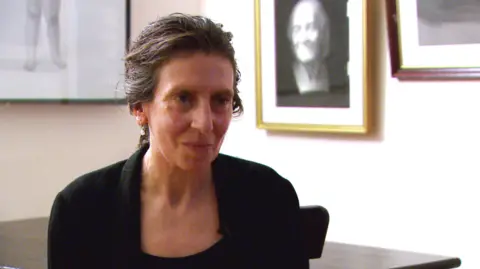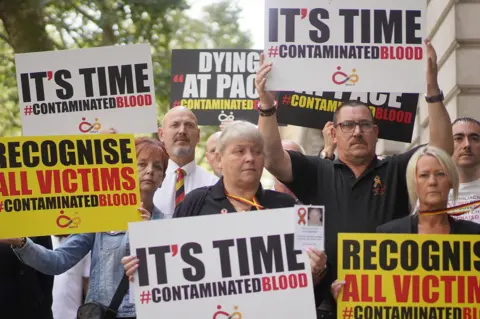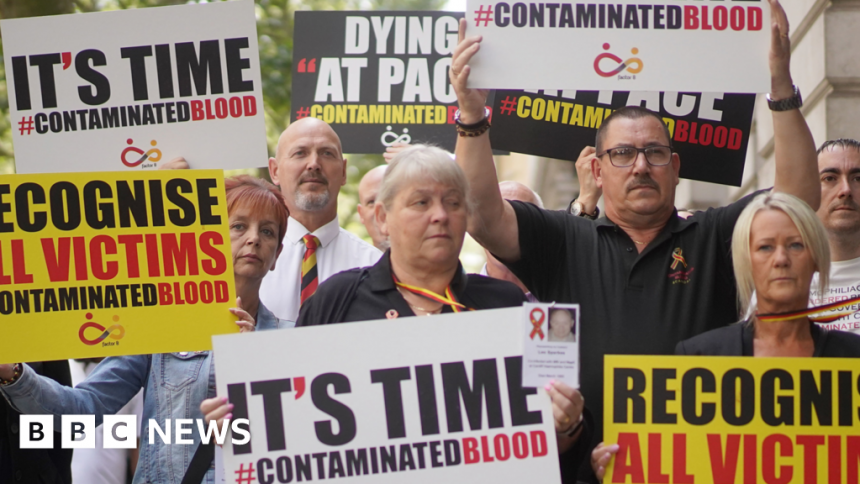Infected blood victims ‘very cautious’ over compensation
 BBC
BBCPatients given infected blood in Scotland will be “very, very cautious” about the UK government’s pledge to push ahead with compensation payments, victims and campaigners have said.
Ministers have insisted they want to press on with the scheme following publication of the public inquiry report into the scandal.
They say regulations will be passed before 24 August to allow the first payments to be made by the end of the year.
But that deadline has been described as “nigh on impossible” by groups working with victims.
Gill Fyffe, who was infected in 1988, said: “Sometimes I think the cover-up and delay has been worse than the actual infections and the amount of suffering it has caused.
“That’s why we’re waiting with some trepidation today because we have been given no information and there have been so many times in the past that what has actually transpired has not been in line with what has been promised.
“We have been told for decades about how concerned governments are and so far absolutely nothing has happened to help me.”
The infected blood scandal has been called the worst treatment disaster in the history of the NHS.
More than 30,000 people in the UK, including about 3,000 in Scotland, contracted HIV and Hepatitis C via contaminated blood products in the 1970s and 80s.
 PA Media
PA MediaAbout 3,000 UK patients have since died – many of them haemophiliacs given infected blood products as part of their treatment.
The size of the payouts will depend on individual circumstances but could top £2m.
The compensation due is being judged under five criteria – harm caused, social impact from stigma and isolation, impact on autonomy and private life, care costs and financial loss.
The first payments will be made to those who were infected. Family members and loved ones of those infected will also be entitled to compensation but that scheme will not be available until next year.
The UK government announcement comes after Sir Robert Francis, the interim chair of the new Infected Blood Compensation Authority, reviewed the recommendations put forward for the scheme by the public inquiry.
Gill Fyffe told the BBC’s Good Morning Scotland programme it had “given us a bit of hope but the devil is in the detail”.
She added: “Some people have sadly passed away and some people are very, very ill and need compensation to survive.
“It can’t change what has happened but hopefully it will stop people suffering or allow them to suffer less.”
Timescale for payments
Bill Wright, chairman of the Haemophilia Scotland group, also questioned whether the timescale for payments was realistic.
He said: “People over the years have felt cheated and it will take a big leap of faith to believe this will happen.
“The UK government have not even done us the courtesy or paid us that respect of coming to us first.
“Governments love to give headline figures (for compensation) and the danger of that is it gives people expectations. We have grown to be very, very cautious.
“I believe it will be nigh on impossible for the first payments to be made by the end of the year.”
Following his review of the inquiry, Sir Robert Francis also suggested the existing support scheme that is currently in place should continue. Originally it had been proposed this would end.
Cabinet Office minister Nick Thomas-Symonds said: “This is an important milestone for victims and campaigners who have waited too long for justice. We’re going to do everything possible to deliver compensation quickly.”






